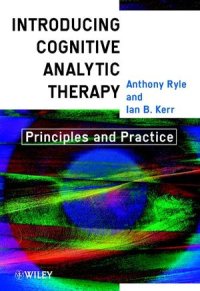
Ebook: Introducing Cognitive Analytic Therapy: Principles and Practice
Author: Anthony Ryle Ian B. Kerr(auth.)
- Year: 2001
- Language: English
- pdf
This is a comprehensive, up-to-date introduction to the origins, development, and practice of cognitive-analytic therapy (CAT).
Written by the founder of the method and an experienced psychiatric practitioner and lecturer, it offers a guide to the potential application and experience of CAT with a wide range of difficult clients and disorders and in a variety of hospital, community care and private practice settings.
Introducing Cognitive Analytic Therapy includes a wide range of features to aid scholars and trainees:
? Illustrative case histories and numerous case vignettes
? Chapters summaries, further reading and glossary of key terms
? Resources for use in clinical settings
Essential reading for practitioners and graduate trainees in psychotherapy, clinical psychology, psychiatry and nursing.Content:
Chapter 1 The Scope and Focus of CAT (pages 1–5):
Chapter 2 The Main Features of CAT (pages 6–20):
Chapter 3 Development of the Self: Background Considerations (pages 21–32):
Chapter 4 Normal and Abnormal Development of the Self and its Implications for Psychotherapy (pages 33–60):
Chapter 5 Selection and Assessment of Patients for Individual CAT (pages 61–79):
Chapter 6 The Reformulation Sessions (pages 80–98):
Chapter 7 The Therapy Relationship: Working at Changing (pages 99–118):
Chapter 8 The Detailed CAT Model of Therapist Interventions and its Use in Supervision (pages 119–130):
Chapter 9 CAT in Various Conditions and Contexts (pages 131–175):
Chapter 10 The Treatment of Personality Disorders (pages 176–201):
Chapter 11 The ‘Difficult’ Patient and Contextual Reformulation (pages 202–213):
Written by the founder of the method and an experienced psychiatric practitioner and lecturer, it offers a guide to the potential application and experience of CAT with a wide range of difficult clients and disorders and in a variety of hospital, community care and private practice settings.
Introducing Cognitive Analytic Therapy includes a wide range of features to aid scholars and trainees:
? Illustrative case histories and numerous case vignettes
? Chapters summaries, further reading and glossary of key terms
? Resources for use in clinical settings
Essential reading for practitioners and graduate trainees in psychotherapy, clinical psychology, psychiatry and nursing.Content:
Chapter 1 The Scope and Focus of CAT (pages 1–5):
Chapter 2 The Main Features of CAT (pages 6–20):
Chapter 3 Development of the Self: Background Considerations (pages 21–32):
Chapter 4 Normal and Abnormal Development of the Self and its Implications for Psychotherapy (pages 33–60):
Chapter 5 Selection and Assessment of Patients for Individual CAT (pages 61–79):
Chapter 6 The Reformulation Sessions (pages 80–98):
Chapter 7 The Therapy Relationship: Working at Changing (pages 99–118):
Chapter 8 The Detailed CAT Model of Therapist Interventions and its Use in Supervision (pages 119–130):
Chapter 9 CAT in Various Conditions and Contexts (pages 131–175):
Chapter 10 The Treatment of Personality Disorders (pages 176–201):
Chapter 11 The ‘Difficult’ Patient and Contextual Reformulation (pages 202–213):
Download the book Introducing Cognitive Analytic Therapy: Principles and Practice for free or read online
Continue reading on any device:

Last viewed books
Related books
{related-news}
Comments (0)